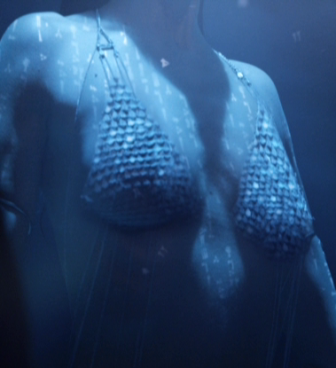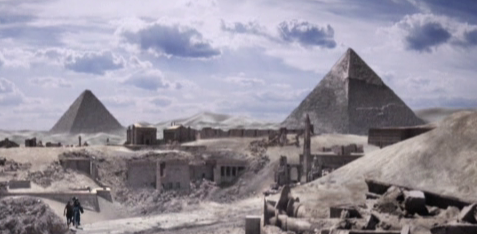Zach McGowan takes over the role of Mathayus here. Mathayus was
last portrayed by Victor Webster in the previous two
Scorpion King installments
Battle for Redemption
and Quest for Power.
The opening narration explains that in ancient Egypt, before the
time of the Pharaohs, King Memtep made a covenant with Anubis, lord
of the underworld, to create a cursed sword fueled by taking the
souls its enemies, with the names of those killed by the sword
written in the Book of Souls. Both
King Memtep and the Book of Souls appear to be fictitious
elements of Egyptian mythology.
The Nubian king Nebserek appears to be a fictitious persona in
history.
Nebserek's chief warrior, Khensa, may be based on the historic
figure of the Nubian queen of the 25th Dynasty of Egypt who married
King Piye, though the Khensa of this film dies as a soldier, not a
queen.
Nebserek plunders the Mesopotamian tomb of King Memtep, taking the
legendary sword called the Fang of Anubis. The
Fang of Anubis appears to be a fictitious object.
As the narrator explains Nebserek's victories and raising of a
powerful jackal army, he mentions the remorseless ruler's quest for
vengeance against the last Akkadian, Mathayus, and remarks, "But
some sleeping giants are better left to their slumber." Likely, the
line was inspired by a line from the end of the 1970 film
chronicling the U.S. war in the Pacific against the Japanese during
WWII, Tora! Tora! Tora!, where the Japanese admiral Isoroku
Yamamoto says, in regards to the Japanese surprise attack on Pearl
Harbor, Hawaii, "I fear all we have done is to awaken a sleeping
giant and fill him with a terrible resolve."
Much of the writing seen on scrolls and engravings in this movie is
similar to cuneiform, which makes sense considering it was adapted
in reality to Akkadian writing. Later in the film, Mathayus remarks
that the writing on the gateway arch he and Tala find in the desert
is Sumerian, "Not so different than the language I learned as a
boy." The Sumerian and Akkadian languages and
cuneiform script are all related.
Tala explains to Mathayus that her father was Balthazar, king of
Nubia, but he is now dead.
Balthazar was seen in The
Scorpion King.
Priestess Mennofer tells Nebserek that the Book of Souls lies in the
Valley of the 13th Moon. This seems to be a fictitious location in
Egypt.
On their quest for the Book of Souls, Mathayus and Tala encounter
the Black Arrows. This is a fictitious tribe of Egypt.
Uruk is surprised when Mathayus shows mercy to him and his men.
Mathayus tells him, "There will be no mercy for those who have
not shown mercy." This is a quote from the New Living
Translation of the Bible, the full quote being, "There
will be no mercy for those who have not shown mercy to others. But
if you have been merciful, God will be merciful when he judges you."
The Book of Souls is guarded by the Temple of Scrolls. The Temple of
Scrolls is a fictitious monument.
Tala remarks that a blue moon occurs every three years after
a summer solstice. In reality, a blue moon can occur every two to
three years. Officially, a blue moon is the third of four full moons
in a season. Tala later remarks on there being a blue moon seven
times in the 19-year Metonic cycle; this is accurate, a
Metonic cycle being very close to 19 years and featuring seven blue
moons.
Enkidu, the protector of the Book of Souls, seems to have been
inspired by the character of Enkidu in the ancient Mesopotamian
Epic of Gilgamesh, c, 2100 BC. In both cases,
Enkidu is a physically powerful artificial being formed from clay.
Amina refers to Enkidu as a golem (a creature from Jewish folklore
made from clay or mud).
When Amina (herself the Book of Souls) places part of her body into the
shaft of light of the blue moon in the Temple of Scrolls, notice
that the particles of "dust" in the moon beam are actually in the
shapes of
cuneiform characters.
|
At 46:02 on the DVD, Amina is suddenly wearing a bra that is
much more concealing of her breasts when she sheds her
meager vestments than what was seen under them before! |
 |
 |
| Anima clothed |
Anima unclothed |
Amina tells Mathayus the Fang of Anubis sword was found in her
father's tomb beneath the city of Amonesh.
Amonesh appears to be a fictitious ancient city.
Mathayus tells Amina they can hire a boat to Amonesh from the port
of Aqaba. Aqaba
is a port city on the Red Sea founded in 4000 BC in the country now
known as Jordan.
Khensa announces her men will ride the Silk Road to where the dunes meet the
sea. The
Silk Road was a system of ancient trade routes linking Asia to
Europe and nations in between, named for the lucrative trade in silk
from China.
At 59:53 on the DVD, Enkidu punches a horse. This may be a swipe
from the 1974 comedy western Blazing Saddles which featured a scene
of the character Mongo punching out a horse.
At 1:00:36 on the DVD, notice that
Enkidu is sitting amongst the rocks, almost camouflaged, on the
outskirts of Mathayus, Tala, and Amina's camp and the campfire they
have lit.

At 1:08:12 on the DVD, Nebserek kills King Tarqa of Nubia, son of
Balthazar, sister of Tala.
As Mathayus and his friends arrive by boat on the beach at 1:11:22
on the DVD, what may be a couple of people on jet skis appear to be
floating in the ocean in the distance. They may have been lookee-loos
observing the film shoot or may have been members of the film crew
placed in the ocean for the safety of the actors or other crew who
might fall into the water and get pulled out by the ocean tide.
At 1:12:06 on the DVD, the two pyramids seen in the ruins of
Amonesh are actually the Pyramid of Khufu and the Pyramid of Khafre
of the Ancient Egyptian Pyramids of Giza.

Amina remarks that the sphinx statue they find in King Memtep's tomb
is an androsphinx, a male sphinx, and that they were known as
messengers of truth. In Ancient Greek mythology, a sphinx referred
to a female of the creature,
androsphinx a male. I've not been able to find an indication in
either Greek or Egyptian mythology that an androsphinx was
considered a messenger of truth. Both types were normally considered
guardians.
Amina thought that the great Sumerian mage who raised her was her father,
but she learns from the scroll they find inside the sphinx statue
that she is actually the daughter of King Memtep.
As Mathayus is held prisoner and sedated by
Nebserek's clan, Tala is somehow mystically able to call forth a
swarm of scorpions who sting him all over his body. This awakens him
and gives him renewed strength, enough for him to free himself from
his chains. It would seem the scorpion venom from the stings has
revitalized him. In
The Scorpion King, he was
first poisoned with scorpion venom and
Cassandra prophesizes that, if he lives, the blood of the scorpion
will always flow through his veins.
Memorable Dialog
power is not given.mp3
some sleeping giants are better left to their slumber.mp3
what do you want from me?.mp3
civilization became too uncivilized.mp3
four men to kill you.mp3
you never tasted pomegranate wine.mp3
the strength of ten men.mp3
I bet you wouldn't sell her.mp3
been looking for you.mp3
men!.mp3
there is honor in payback.mp3
the Scorpion King.mp3
Back to The Mummy Episode Studies